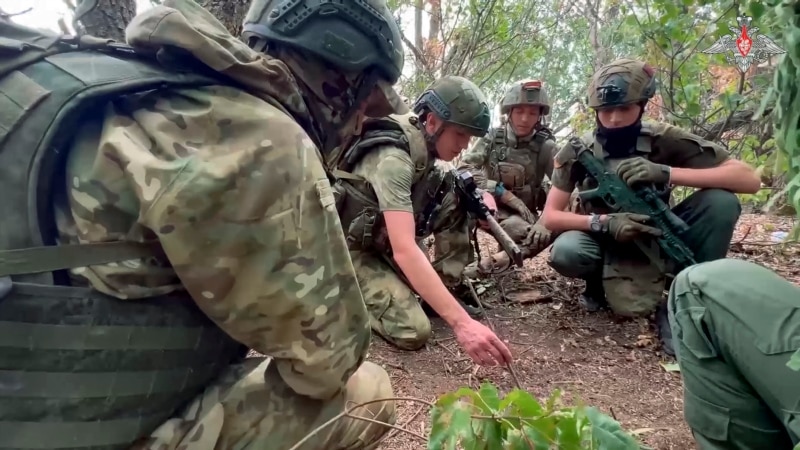The social media ads promised the young African women a free plane ticket, money and a faraway adventure in Europe. Just complete a computer game and a 100-word Russian vocabulary test.
But instead of a work-study program in fields like hospitality and catering, some of them learned only after arriving on the steppes of Russia’s Tatarstan region that they would be toiling in a factory to make weapons of war, assembling thousands of Iranian-designed attack drones to be launched into Ukraine.
In interviews with The Associated Press, some of the women complained of long hours under constant surveillance, of broken promises about wages and areas of study, and of working with caustic chemicals that left their skin pockmarked and itching.
To fill an urgent labor shortage in wartime Russia, the Kremlin has been recruiting women aged 18-22 from places like Uganda, Rwanda, Kenya, South Sudan, Sierra Leone and Nigeria, as well as the South Asian country of Sri Lanka. The drive is expanding to elsewhere in Asia as well as Latin America.
That has put some of Moscow’s key weapons production in the inexperienced hands of about 200 African women who are working alongside Russian vocational students as young as 16 in the plant in Tatarstan’s Alabuga Special Economic Zone, about 1,000 kilometers east of Moscow, according to an AP investigation of the industrial complex.
“I don’t really know how to make drones,” said one African woman who had abandoned a job at home and took the Russian offer.
The AP analyzed satellite images of the complex and its internal documents, spoke to a half-dozen African women who ended up there, and tracked down hundreds of videos in the online recruiting program dubbed “Alabuga Start” to piece together life at the plant.
A hopeful journey from Africa leads to ‘a trap’
The woman who agreed to work in Russia excitedly documented her journey, taking selfies at the airport and shooting video of her airline meal and of the in-flight map, focusing on the word “Europe” and pointing to it with her long, manicured nails.
When she arrived in Alabuga, however, she soon learned what she would be doing and realized it was “a trap.”
“The company is all about making drones. Nothing else,” said the woman, who assembled airframes. “I regret and I curse the day I started making all those things.”
The workers were under constant surveillance in their dorms and at work, the hours were long and the pay was less than she expected — details corroborated by three other women interviewed by AP, which is not identifying them by name or nationality out of concern for their safety.
Factory management apparently tries to discourage the African women from leaving, and although some reportedly have left or found work elsewhere in Russia, AP was unable to verify that independently.
A drone factory grows in Tatarstan
Russia and Iran signed a $1.7 billion deal in 2022, after President Vladimir Putin invaded neighboring Ukraine, and Moscow began using Iranian imports of the unmanned aerial vehicles, or UAVs, in battle later that year.
The Alabuga Special Economic Zone was set up in 2006 to attract businesses and investment to Tatarstan. It expanded rapidly after the invasion and parts switched to military production, adding or renovating new buildings, according to satellite images.
Although some private companies still operate there, the plant is referred to as “Alabuga” in leaked documents that detail contracts between Russia and Iran.
The Shahed-136 drones were first shipped disassembled to Russia, but production has shifted to Alabuga and possibly another factory. Alabuga now is Russia’s main plant for making the one-way, exploding drones, with plans to produce 6,000 of them a year by 2025, according to the leaked documents and the Washington-based Institute for Science and International Security.
That target is now ahead of schedule, with Alabuga building 4,500, said David Albright, a former U.N. weapons inspector who works at the institute.
Finding workers was a problem. With unemployment at record lows and many Russians already working in military industries, fighting in Ukraine or having fled abroad, plant officials turned to using vocational students and cheap foreign labor.
Documents leaked last year and verified by Albright and another drone expert detail the workforce growing from just under 900 people in 2023 to plans for over 2,600 in 2025. They show that foreign women largely assemble the drones, use chemicals and paint them.
In the first half of this year, 182 women were recruited, largely from Central and East African countries, according to a Facebook page promoting the Alabuga Start program. It also recruits in South America and Asia “to help ladies to start their career.”
Officials held recruiting events in Uganda, and tried to recruit from its orphanages, according to messages on Alabuga’s Telegram channel. Russian officials have also visited more than 26 embassies in Moscow to push the program.
The factory also draws workers from Alabuga Polytechnic, a nearby vocational boarding school for Russians age 16-18 and Central Asians age 18-22 that bills its graduates as experts in drone production. According to investigative outlets Protokol and Razvorot, some are as young as 15 and have complained of poor working conditions.
Surveillance, caustic chemicals — and a Ukrainian attack
The foreign workers travel by bus from their living quarters to the factory, passing multiple security checkpoints after a license plate scan, while other vehicles are stopped for more stringent checks, according to the woman who assembles drones.
They share dormitories and kitchens that are “guarded around the clock,” social media posts say. Entry is controlled via facial recognition, and recruits are watched on surveillance cameras. Pets, alcohol and drugs are not allowed.
The foreigners receive local SIM cards for their phones upon arrival but are forbidden from bringing them into the factory, which is considered a sensitive military site.
The airframe worker told AP the recruits are taught how to assemble the drones and coat them with a caustic substance with the consistency of yogurt.
Many workers lack protective gear, she said, adding that the chemicals made her face feel like it was being pricked with tiny needles, and “small holes” appeared on her cheeks, making them itch severely.
Although AP could not determine what the chemicals were, drone expert Fabian Hinz of the International Institute for Strategic Studies confirmed that caustic substances are used in their manufacture.
In addition to dangers from chemicals, the complex itself was hit by a Ukrainian drone in April, injuring at least 12 people. A video it posted on social media showed a Kenyan woman calling the attackers “barbarians” who “wanted to intimidate us.”
“They did not succeed,” she said.
Workers ‘maltreated like donkeys’
Although one woman said she loved working at Alabuga because she was well-paid and enjoyed meeting new people and experiencing a different culture, most interviewed by AP disagreed about the size of the compensation and suggested that life there did not meet their expectations.
The program initially promised recruits $700 a month, but later social media posts put it at “over $500.”
The airframe assembly worker said the cost of their accommodation, airfare, medical care and Russian-language classes were deducted from her salary, and she struggled to pay for basics like bus fare with the remainder.
The African women are “maltreated like donkeys, being slaved,” she said, indicating banking sanctions on Russia made it difficult to send money home. But another factory worker said she was able to send up to $150 a month to her family.
Four of the women described long shifts of up to 12 hours, with haphazard days off. Still, two of these who said they worked in the kitchen added they were willing to tolerate the pay if they could support their families.
AP contacted the Russian Foreign Ministry and the offices of Tatarstan Gov. Rustam Minnikhanov and Alabuga Special Economic Zone Director General Timur Shagivaleev for a response to the women’s complaints but received no reply.
www.Megalopoles.online




